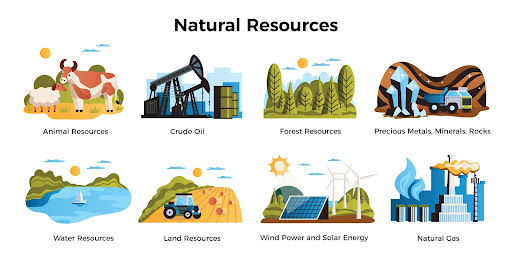
Understanding Natural Resources: The Earth’s Wealth
Natural resources are the foundation of our existence on this planet. They are the raw materials and elements that sustain life, fuel industries, and shape the world as we know it. From the air we breathe to the water we drink, from the minerals in our gadgets to the energy that powers our homes, natural resources are inextricably woven into the fabric of our daily lives. In this article, we will explore the significance of natural resources, their types, management, and the challenges they pose to the global community.
What Are Natural Resources?
Natural resources encompass all the materials and elements found in the environment that are necessary for the survival and well-being of living organisms, including humans. These resources are divided into two broad categories:
1. Renewable Resources
Renewable resources are those that can be naturally regenerated over time, ensuring a continuous supply. Examples include:
a. Water:
- Freshwater bodies, like rivers and lakes, provide water for drinking, irrigation, and industrial use.
- Groundwater is a vital source for drinking water and agriculture.
b. Solar Energy:
- Solar radiation is harnessed for electricity generation through photovoltaic cells.
- Solar thermal energy is used for heating and cooling applications.
c. Wind Energy:
- Wind turbines capture wind energy for electricity generation.
2. Non-Renewable Resources
Non-renewable resources are finite and cannot be replaced within human timescales. They include:
a. Fossil Fuels:
- Coal, oil, and natural gas are used for energy production and are the primary drivers of the global energy industry.
b. Minerals:
- Metals like iron, copper, and aluminum are essential for construction and manufacturing.
- Precious minerals like gold and silver have economic and industrial significance.
c. Nuclear Fuels:
- Uranium is utilized for nuclear power generation.
The Significance of Natural Resources
Natural resources are the lifeblood of our civilization and play a crucial role in our economic, social, and environmental well-being:
Economic Significance:
- Job Creation: Industries that extract, process, and utilize natural resources provide employment for millions globally.
- Economic Growth: The exploitation of resources fuels economic development, contributing to GDP growth.
- Trade and Revenue: Many nations rely on resource exports for foreign exchange earnings, supporting government revenue.
Social Significance:
- Sustenance: Resources like food and water are fundamental for human survival.
- Infrastructure: Building materials, energy, and minerals are essential for constructing and maintaining infrastructure.
- Health: Pharmaceuticals and medicinal herbs are derived from natural resources.
Environmental Significance:
- Ecosystem Health: Biodiversity, clean air, and water quality depend on the sustainable management of resources.
- Climate Change: Natural resources are linked to carbon emissions and climate change, as fossil fuels are major contributors to greenhouse gases.
Resource Management and Conservation
Sustainable management and conservation of natural resources are essential to ensure their availability for future generations. This involves responsible practices in resource extraction, utilization, and recycling:
1. Sustainable Agriculture:
- Practices like crop rotation and organic farming help maintain soil fertility and reduce the need for chemical inputs.
2. Forest Management:
- Sustainable logging practices ensure the regeneration of forests and preservation of biodiversity.
3. Water Conservation:
- Efficient water use in agriculture, industry, and households is crucial to combat water scarcity.
4. Renewable Energy:
- Transitioning to renewable energy sources reduces dependence on fossil fuels and lowers carbon emissions.
5. Recycling:
- Recycling materials like metals, paper, and plastics reduces the demand for new resources and minimizes waste.
Challenges in Resource Management
The management of natural resources faces various challenges, including:
1. Overexploitation:
- Overuse of resources can lead to depletion and environmental degradation, such as deforestation and soil erosion.
2. Pollution:
- The release of pollutants into air, water, and soil can harm ecosystems and human health.
3. Climate Change:
- The burning of fossil fuels contributes to global warming and extreme weather events.
4. Habitat Destruction:
- Urbanization and agricultural expansion often result in the loss of natural habitats.
5. Geopolitical Conflicts:
- Control over valuable resources can lead to geopolitical tensions and even armed conflicts.
Conclusion
Natural resources are the foundation of human civilization. They provide us with essential elements for survival, drive our economies, and shape our environment. The responsible management and conservation of these resources are critical to ensure a sustainable future for our planet. As we face challenges such as overexploitation and climate change, it is imperative that we act collectively to safeguard the Earth’s wealth for generations to come.




